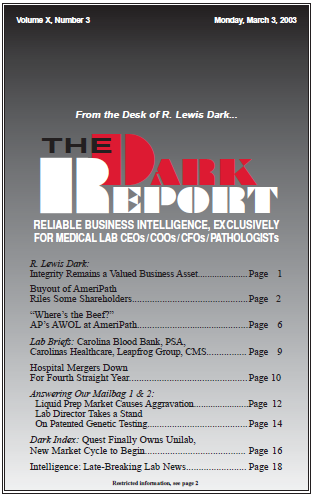PERSISTENCE FINALLY PAID OFF for Quest Diagnostics Incorporated. On February 26, it took ownership of Unilab Corporation, capping almost 11 months of effort. In completing this acquisition, Quest Diagnostics completes the two blood brothers’ acquisition sweep of mid-sized public lab companies during 2002. The familiar names of American Medical Laboratories, Dynacare, DIANON Systems, and Unilab …
Quest Finally Owns Unilab, New Market Cycle To Begin Read More »
To access this post, you must purchase The Dark Report.


